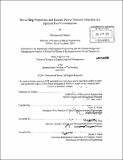Naval ship propulsion and electric power systems selection for optimal fuel consumption
Author(s)
Sarris, Emmanouil
DownloadFull printable version (43.55Mb)
Other Contributors
Massachusetts Institute of Technology. Engineering Systems Division.
Advisor
Mark S. Welsh.
Terms of use
Metadata
Show full item recordAbstract
Although propulsion and electric power systems selection is an important part of naval ship design, respective decisions often have to be made without detailed ship knowledge (resistance, propulsors, etc.). Propulsion and electric power systems have always had to satisfy speed and ship-service power requirements. Nowadays, increasing fuel costs are moving such decisions towards more fuel-efficient solutions. Unlike commercial ships, naval ships operate in a variety of speeds and electric loads, making fuel consumption optimization challenging. This thesis develops a flexible decision support tool in Matlab® environment, which identifies the propulsion and ship-service power generation systems configuration that minimizes fuel consumption for any ship based on its operating profile. Mechanical-driven propulsion systems with or without propulsion derived ship-service power generation, separate ship-service systems and integrated power systems are analyzed. Modeling includes hull resistance using the Holtrop-Mennen method requiring only basic hull geometry information, propeller efficiencies using the Wageningen B series and transmission and prime movers fuel efficiencies. Propulsion and ship-service power generation systems configuration is optimized using the genetic algorithm. US Navy's Advanced Surface Ship Evaluation Tool (ASSET) model for the DDG-51 Flight I destroyer was used for modeling validation. Optimal fuel consumption results are compared against the existing configuration for the DDG-51 Flight I destroyer using a representative operating profile.
Description
Thesis (Nav. E.)--Massachusetts Institute of Technology, Dept. of Mechanical Engineering; and, (S.M. in Engineering and Management)--Massachusetts Institute of Technology, Engineering Systems Division, System Design and Management Program, 2011. Cataloged from PDF version of thesis. Includes bibliographical references (p. [100]-102).
Date issued
2011Department
System Design and Management Program.; Massachusetts Institute of Technology. Department of Mechanical Engineering; Massachusetts Institute of Technology. Engineering Systems DivisionPublisher
Massachusetts Institute of Technology
Keywords
Mechanical Engineering., Engineering Systems Division.